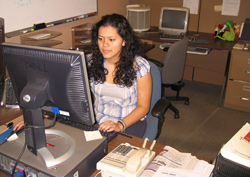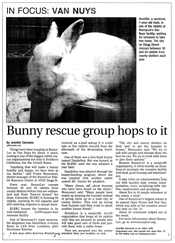Journalist in the making
A disorganized journalism class and being censored still taught Jennifer, 18, about being a reporter.
My dream is to become a journalist. I started realizing this while taking journalism as an elective freshman year. Since then I’ve had a lot of great experiences with my school’s journalism club and an internship at the Los Angeles Daily News. Unfortunately, I’ve also had some negative experiences—a disorganized journalism class and having my writing censored. Despite all that, I still want to become a journalist because I love to write and express my ideas.
I used to dream of writing fiction, because I love to tell stories. But while taking journalism in ninth grade, I realized my passion was telling real stories. Journalism let me write about current events I care about, like the immigration debates. I am a naturally shy person, but writing my thoughts motivated me to investigate things further and gave me a reason to ask questions.
Unfortunately, my articles were never published, so the students at High Tech High–Los Angeles, which places emphasis on computers and technology, were never able to read my stories. The journalism class never updated its website because most of the articles weren’t well-written and the students didn’t try to improve them after the teacher gave back edits. Eventually, the class was discontinued in the spring of my freshman year. However, I still got a lot of out the class and wanted to continue with journalism.
So I started a journalism club at my school. I dreamed that the journalism club would be everything the class should have been. It would give students a place to express themselves by publishing stories about local and national issues. We were going to start a new online newspaper that we would update and produce a yearbook. I wanted the journalism club to be one of the biggest things going on at HTH, right next to our widely acclaimed robotics team.
In the end, we never created a newspaper because we didn’t have the support or guidance from a teacher. But we managed to produce a digital yearbook on CD at the end of my sophomore year. The school finally granted us permission to do the yearbook in May and then the club members spent the next four weeks meeting practically every day after school and working eight-hour days on weekends. The teachers and students congratulated us for doing it so quickly and creatively. I was immensely proud that I had been in charge of the club that created HTH’s first official yearbook.
Because of the stress involved in putting the yearbook together, I thought it would be easier for the club to have its own advisory, which is similar to homeroom, during junior year so we could devote more time to it. I asked our principal, Mrs. Rybin, for an advisory. Instead, the school gave us an elective class for the next academic year. I was concerned that the elective might attract students who thought it would be an easy class.
“We offered it as an elective because that’s the way I wanted it,” said Ms. Rybin, in an interview I conducted last fall. “I wanted the traditional way a journalism class operates in a traditional high school and that is that it’s a class.”
The journalism elective began with 14 students—11 of the original club members and three new ones—in the 2006-2007 school year. To the staff’s surprise, the elective quickly gained popularity. By the end of the second week there were 29 students.
In late September, our journalism teacher, Ms. Guevara, informed me that the journalism club was being discontinued. No one asked the members of the club their opinions. I felt like I had worked really hard the previous year and getting replaced by a class didn’t seem fair. The former club members said they felt the same, but did nothing about it.
I wasn’t allowed to write the article I wanted
I questioned how the school had a right to shut down a club so abruptly. I decided to write an article opposing my school’s decision as an opinion piece for the HighTech Times, HTH’s new online newspaper managed by the journalism class. I turned in my first draft to Ms. Guevara and she handed it back to me almost immediately. She told me it was inappropriate and to rewrite the whole thing. She didn’t give me any instructions. I was upset, but did as she told me. I deleted more than half and added some good things about the elective. I turned in my second draft and when I got it back, the small part I had kept about the club being discontinued had also been deleted. My opinion piece was transformed into a promotional piece that said the elective was great.
Feeling like I had no other option and fearing for my grade, I let her publish the revised article on the newspaper’s website. I thought it was an infringement on my First Amendment right to freedom of speech, but as a student I didn’t object because I wasn’t sure of my rights.
A few weeks later, I researched the subject and learned that according to Tinker v. Des Moines (1969) students do not “shed their Constitutional rights to freedom of speech or expression at the schoolhouse gate.” This made me think that I wasn’t crazy in believing I had a right to freedom of speech even within school. But then I learned that in 1988 the Supreme Court ruled in Hazelwood School v. Kuhlmeier that schools were granted the power to censor articles that could be considered disruptive to learning.
I realized that I didn’t know anything about my free speech rights. There are so many court cases about freedom of speech and I had never been taught any of them in either of my journalism classes. I wondered why not.
As the year progressed, my fears became reality. The elective was going nowhere. Half of the students didn’t seem very interested—they complained about having to write in the class. How can you join journalism and not want to write? We spent our time on busywork like writing current events summaries and mini-magazine projects that ended up gathering dust on the classroom shelves. As I edited the other students’ work, they were listening to music or doing math homework. We didn’t create a yearbook or keep an up-to-date online newspaper.
The response we usually received from Ms. Guevara about why we weren’t writing stories or working on the yearbook was “We have all year to plan it out.” I was so frustrated. The students didn’t seem to care and my censored article haunted my thoughts. The class had gone from a marvelous opportunity to a horrible let down.
So while writing this article for L.A. Youth a year later, I finally decided to ask my teacher, Ms. Guevara, why she didn’t let me publish my original opinion article. Her response surprised me.
“As a journalism teacher, you’re between the wall and the sword,” Ms. Guevara said as she looked at me thoughtfully. “You can give the students a certain amount of rights, but then you also have to go by school law and our regulations set on us by the state … personally I felt it was more of a journal entry than an article because it felt like you were more upset about something more than writing professionally.”
The truth was I had been going through very tough times during those early weeks of school last year. I was struggling with my family and with myself. As a result, my opinion piece was filled with sarcastic comments about the discontinuation of the club and unfounded accusations that blamed other people for shutting down the club, even though I didn’t have any evidence. Now I know that’s unfair and poor journalism not to get the other side of the issue, which I learned after writing more articles for other publications.
However, I still don’t think that I should have been censored. It would have been better if my teacher had tried to help me with my article. Sadly, no one at school did and I found myself feeling defeated. In the end even I didn’t put in the effort in class. Looking back now, I wish I had taken more initiative to make the elective work back then and talked to Ms. Guevara about the problem.
When I interviewed Ms. Guevara, she said that one of the reasons we never updated the online newspaper was because she wasn’t very fond of online publications. Nonetheless, I feel that given the limited funds we had, having an online publication would have been the best for us since we are HTH’s journalism elective. She also said that the reason we didn’t have a yearbook was because we didn’t have the support or money for it.
Ms. Rybin, our principal, said that students less interested in journalism ended up in the class because she was trying to make sure that all the electives had enough students. “I think that if we’d just had the core people that were interested in producing something and working collaboratively it would have been a lot smoother,” Ms. Rybin said. I couldn’t have agreed with her more.
An ideal journalism class would be one in which everyone is participating and they publish a good newspaper. The students would learn and practice the basics of journalism—fairness and libel law, writing in journalism style and our First Amendment rights. Everyone would be enthusiastic about researching and talking about court cases involving freedom of speech. Everyone would want to read up on current events and write in-depth articles about their experiences and thoughts.
I learned that being a good journalist requires dedication
After everything I went through, I do not regret the experience. Discovering my passion for journalism, founding my club, getting the school to create a journalism elective, writing my opinion piece, and finally realizing how much everything, even family problems, can change how you perceive things helped me become a stronger person and writer. I worked on this article and have seen it transform so much from the first draft. I have researched, interviewed, analyzed, edited, deleted, rephrased and written out all my thoughts for everyone to read: that is what a journalist does.
Last fall I interned at the Los Angeles Daily News and wrote articles that were published in the newspaper and online. I really enjoyed my internship and learned a lot about writing articles and what it’s like working for a newspaper with reporters constantly stressing over deadlines. The experience I gained working at the Daily News helped prepare me to be Editor-in-Chief of HTH’s newspaper.
A couple months into the new semester, the journalism newspaper staff has managed to publish several issues of the HighTech Times, which have been distributed through e-mail, every couple weeks. Also, the yearbook staff, another branch of the journalism elective, has raised $500 so far for the yearbook. Although time is running short, I know we’ll get it done on time.
At first, students were overwhelmed with the new structure of the class, but now they are willing to work. Teachers have congratulated us on every issue. Since everyone at school is finally recognizing the journalism elective as more than a class, students are taking pride in being a part of the class’s accomplishments.
I want the elective to prosper because this is what I want to do with my life. I plan to study journalism this fall when I go to college, and this experience has helped me prepare for that. Writing this article and studying at HTH have helped me see what is in store for me when I pursue a career as a journalist: outrage, controversy, hardship, millions of edits, realizations and surprises. It is something I have come to expect and accept.










